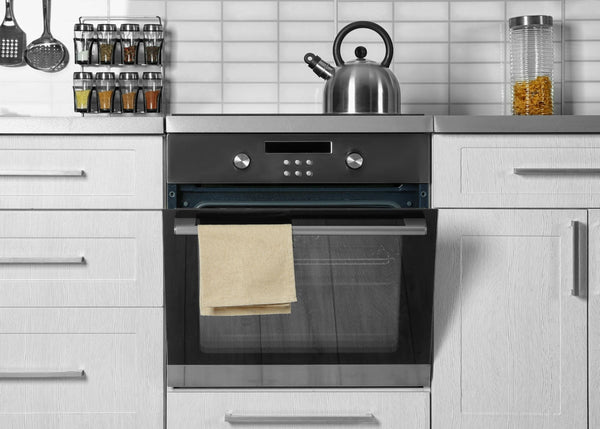
When it's time to replace a stove, many homeowners are faced with the tough choice of whether to go with a gas or electric unit. Both types have their own set of advantages you should consider regardless of what you've used in the past. Are you wondering about the differences between cooking with an electric stove vs gas stove? We've created a helpful guide below to explain.
History of Stoves: Gas and Electric
To truly appreciate the gas vs. electric range face-off, we ought to start at the very beginning. Gas stoves, with their familiar blue flames, date back to the early 1800s. They became household staples by the 1900s, offering a tactile experience with manual dials and instant heat. Electric stoves, on the other hand, made their debut in the late 19th century, gradually gaining traction for their clean design and even heating.
Gas stoves continue to be favored by many professional chefs for their precise temperature control and ability to deliver high heat quickly. They are also relatively inexpensive to operate, especially in areas with abundant natural gas reserves. Not being reliant on electricity also makes them more useful, even in the event of a power outage. However, gas stoves can be messy to clean and produce indoor air pollution.
Electric stoves, on the other hand, are much easier to clean and maintain. They also emit no indoor air pollution, making them a healthier option for families with young children or people with allergies. However, as it will be elaborated on more later, electric stoves can be more expensive to operate than their gas counterparts, especially in areas with high electricity rates.
In recent years, there has even been a growing trend towards hybrid stoves that combine the best features of both gas and electric models. For example, some hybrid dual-fuel range stoves have gas burners for the stovetop and an electric oven. This allows homeowners who are on the fence about whether to get a gas vs electric stove to simply enjoy the benefits of both cooking methods without having to sacrifice convenience or performance.
Fuel Sources
The most apparent difference of a between a gas vs electric stove is how they receive their power. To operate a gas oven, you'll need to connect the appliance to a natural gas line or propane hookup. Electric ovens work by plugging them into an outlet to handle the appliance's high energy consumption.
How Gas Ovens Work
Gas ovens heat food by a combination of radiation, conduction, and convection generated by flames that are carefully controlled at different rates in each section of the oven. There's also a flame spreader to help radiate the heat evenly. You can ignite gas using a glow igniter or a spark ignition system.
You'll find that oven cavities tend to be more open, allowing for faster cooling and venting of combustible gases. A temperature thermistor or thermostat will be used just like it would be for an electric oven.
How Electric Ovens Work
Like a gas oven, an electric oven warms food by radiation, conduction, and convection, but only using electricity. Electric oven units can have several elements on the cooktop at various sizes that you can control at different temperatures through a knob switch. There could be multiple broils, bake, and convection elements as well.
Oven cavities are typically more airtight and use a cooling fan to keep the cavity cool. These types of ovens will use a temperature thermistor or thermostat, just like you'd find in a gas oven.
Availability of Each in Your Home
You can install an electric oven right away in most households if you have at least a 240-volt power supply. However, before installing a gas stove, you must already have a natural gas line or have one fitted. If you have both options in one place already, you should be able to hook up a dual-fuel oven without much issue.
If it doesn't already come with one, you would only have to turn the 240vac outlet into a junction box or add a plug to the dual-fuel oven. Before embarking on this project, you should consult with an expert and hire qualified personnel to establish the necessary connections and hookups.
Length of Time To Preheat
Gas ovens tend to generate much higher cooking temperatures quicker than electric ovens. A gas stove takes around 10-15 minutes to reach the proper temperature, but an electric stove takes about 20-30 minutes.
Heat Distribution
The trade-off for gas's greater control is that it heats more unevenly, resulting in cold and hot areas scattered throughout the interior. Typically, your oven can use internal fans to mitigate these issues. However, if there are no fans, you may need to rotate your meal a few times to achieve the optimum temperature throughout the food.
Electric ovens provide a drier, more uniform heat distribution throughout the cooking process. This distribution ensures that your meal gets evenly heated without any outside help. Some electric ovens also have a steam option to help maintain moisture. This option works very well when making bread.
Functionality When Cooking
Gas ovens generate wet heat, which is ideal for dishes that quickly dry up. The environment is perfect for baking cakes and pies that stay moist after you've finished cooking them. It's also easy to leave savory dishes uncovered in a baking dish drenched in broth or sauce, as the flavor will absorb into the food without drying out.
Since electric ovens produce drier heat, they're better for roasting or broiling foods. Broiling sears the dish's surface and works particularly well on thinner foods. In particular, this technique helps create exceptional texture to the outside of foods you've already cooked another way.
Some home chefs favor electric cooktops over gas cooktops for their stability. This stability is because the burners on top of an electric stove are entirely flat, providing you with a completely level and sturdy surface to set pots and pans down on.
On the other hand, gas cooktops feature metal grates that you set your cookware on above an active flame. Comparatively, this is a more uneven surface that requires added control and hand-eye coordination.
Safety Concerns
While electric ovens are not entirely risk-free to own and use, they are typically safer than gas ovens simply because they do not use gas or open flames. Ensure your stove is safely connected to a gas line and keep an eye out for indicators of gas flowing but not igniting. You should also make sure you have a functioning carbon monoxide detector inside the kitchen to be safe.
The stability of both cooktops can also factor into safety concerns. There's negligible risk involved as long as you don't directly touch an electric burner or leave it on after cooking. Even with metal grates covering it, there's always a fire risk present whenever there's an open flame. Keep an eye out for any combustible materials, such as paper and kitchen towels, that may inadvertently come into contact with the flame.
Regardless of what type of stove you have, you always need to make sure you turn everything off when you finish cooking. The last thing you want is to risk a fire breaking out due to carbon monoxide leaking into your home when you're not paying attention.
Cost Comparison: Initial Investment and Long-Term Expenditure
When comparing the cost of buying and maintaining an electric stove vs a gas stove, some considerations you’ll want to take into account include
Initial Price: Electric ranges often come with a friendlier initial price tag. This is because electric stoves are simpler in design and have fewer moving parts than gas stoves. However, the price difference between electric and gas stoves has narrowed in recent years as electric stove manufacturers have added new features and technologies.
- Maintenance Costs: Electric stoves might need fewer repairs, given fewer moving parts. However, both electric and gas stoves require regular maintenance, such as cleaning and replacing filters. The cost of maintenance will vary depending on the brand and model of the stove, as well as the frequency of use.
- Energy Bills and Overall Lifetime Expenditure: Gas tends to win here, given its lower cost per unit of energy. According to the U.S. Department of Energy, the average monthly operating cost of a gas range is $2.34, compared to $5.94 for an electric range. This is because gas is a more efficient fuel source than electricity. Over the lifetime of a stove, the energy savings from a gas stove can add up to hundreds or even thousands of dollars.
- Installation Costs: Gas stoves may require professional installation, which can add to the upfront cost. Electric stoves can be self-installed, which can save money.
- Rebates and Incentives: Many utilities offer rebates and incentives for appliances with notable energy efficiency, including electric and gas stoves. This can further reduce the cost of purchasing and operating, depending, of course, on the model purchased and how it meets the qualifications for rebates and incentives.
Cleaning
Gas ovens tend to be more challenging to clean. The burners tend to become clogged up, and there are plenty of nooks and crannies that limit full-scale cleaning. They also make disassembling components for cleaning more difficult or impossible.
In addition, there is usually a glow igniter within the oven area, which can be readily destroyed by cleaning solutions or cleaning products. These appliances are also more prone to spills reaching the bottom.
Electric ovens often have a concealed element and a smooth cavity, allowing considerably easier cleaning. Electric cooktops are also relatively easier to disassemble, and if it's a glass top, all you need to do is wipe down the glass. While both units have a self-clean option, only electric ovens have a steam clean option as well.
So, when it comes down to it, what are the differences between cooking with gas vs. electric ovens that can help you decide which one to invest in? When buying a new oven, things to consider would be the type of hook-up you have, which type of oven you'd prefer cleaning, and the kind of heat source you prefer, while also considering preheating and cooling downtimes.
Ultimately, your final decision to buy a kitchen range will come down to which one you prefer the most, a gas stove or an electric stove, since they’re both great options. You should consider a dual-fuel version if you are on the fence about it.
Here at Town Appliance, we offer a comprehensive selection of gas and electric ovens when you’re ready to upgrade. Feel free to contact us with any questions about our products.







